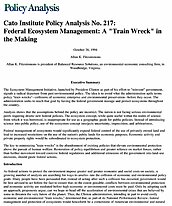The Ecosystem Management Initiative, launched by President Clinton as part of his effort to “reinvent” government, signals a radical departure from past environmental policy. The idea is to avoid what the administration aptly terms policy “train wrecks”–collisions of economic enterprise and environmental preservation–before they occur. The administration seeks to reach that goal by having the federal government manage and protect ecosystems throughout the country.
Analysis shows that the assumptions behind the policy are incorrect. The nation is not facing serious environmental perils requiring drastic new federal policies. The ecosystem concept, while quite useful within the realm of science from which it was borrowed, is inappropriate for use as a geographic guide for public policies. Instead of introducing science into public policy, use of the ecosystem concept interjects uncertainty, imprecision, and arbitrariness.
Federal management of ecosystems would significantly expand federal control of the use of privately owned land and lead to increased restrictions on the use of the nation’s public lands for economic purposes. Economic activity and private property rights would be subordinated to ecosystem protection.
The key to minimizing “train wrecks” is the abandonment of existing policies that elevate environmental protection above the pursuit of human welfare. Restoration of policy equilibrium and greater reliance on market forces, rather than further movement toward coercive federal regulations and additional intrusions of the government into land-use decisions, should guide federal actions.
About the Author

This work is licensed under a Creative Commons Attribution-NonCommercial-ShareAlike 4.0 International License.
